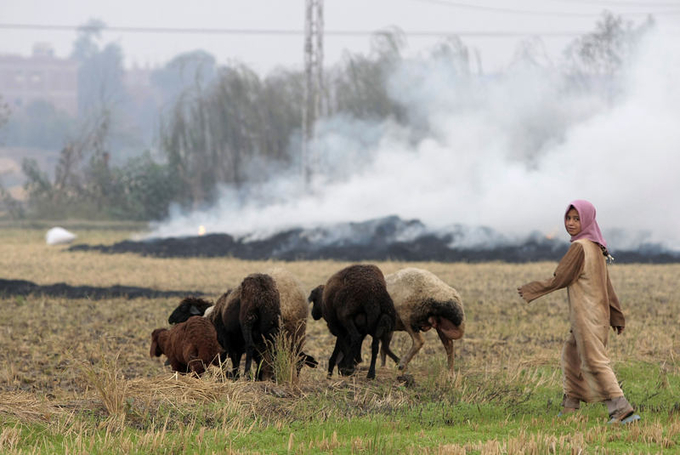May 16, 2025 | 10:34 GMT +7
May 16, 2025 | 10:34 GMT +7
Hotline: 0913.378.918
May 16, 2025 | 10:34 GMT +7
Hotline: 0913.378.918

Burning rice straw after harvest in Egypt increases greenhouse gas emissions in Africa. Photo: MENAFN.
According to research from the Future Ecosystems Program at the University of the Witwatersrand (South Africa), agricultural production and fossil fuel use are the two main causes of increased carbon emissions in Africa. Between 2010 and 2019, burning fossil fuels generated an average of 21.3 million tons of CO2 per year from this region. About half of this CO2 is naturally absorbed, but nearly 10.65 million tons are released into the atmosphere.
Natural sources, such as wildfires, also contribute to increased methane emissions, significantly impacting climate change and land use. The research team developed a comprehensive GHG emissions budget for Africa, using global and local data to determine the causes of the increase in GHG emissions over the past decade.
Dr. Yolandi Ernst, head of the research project at the Wits Global Change Institute, stated: “In Africa, the increase in GHG emissions mainly comes from the use of fossil fuels and agricultural production. Without strong measures to reduce GHGs emissions and an increase in carbon sequestration through expanded forest cover and biomass production, Africa risks becoming a greater emitter of greenhouse gases than it can absorb in the future.”
Dr. Andreas Schwarz Meyer, a researcher from the University of Cape Town (South Africa), agrees and reflects on history: Africa is one of the continents with the lowest GHG emissions. He called for support from the international community to introduce measures to reduce GHG emissions in Africa without affecting key development sectors.
Source: Nature Africa

(VAN) Fourth most important food crop in peril as Latin America and Caribbean suffer from slow-onset climate disaster.

(VAN) Shifting market dynamics and the noise around new legislation has propelled Trouw Nutrition’s research around early life nutrition in poultry. Today, it continues to be a key area of research.

(VAN) India is concerned about its food security and the livelihoods of its farmers if more US food imports are allowed.

(VAN) FAO's Director-General emphasises the need to work together to transform agrifood systems.

(VAN) Europe is facing its worst outbreak of foot-and-mouth since the start of the century.

(VAN) The central authorities, in early April, released a 10-year plan for rural vitalization.

(VAN) Viterra marked a significant milestone in its carbon measurement program in Argentina, called Ígaris, reaching 1 million soybean hectares measured.